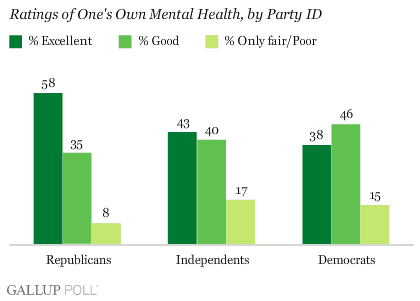
I wasn't sure how I was going to comment on this poll without it looking like I was saying, "Haha, Republicans are saner than others." Yet, a poll with these findings can't be ignored after similar polls have shown that Republicans are happier, are more satisfied with their committed relationships, and even report having better sex lives than others.
I know that some (mostly liberals) will dismiss these findings with the age old stereotype that Republicans have more money, and ergo, better lives. However, as the Gallup poll shows, Republicans of all income ranges report better mental health than others of the same income level. So, again, why these findings?
I think these polls demonstrate "the role of the imagination as a source of wisdom and as a source of more or less dangerous illusion" (Claes G. Ryn, Will, Imagination, and Reason: Babbitt, Croce, and the Problem of Reality, p. 147). In other words, "[c]ertain types of imagination draw us into misleading views of the world, and indeed, may make us lose touch with realty. Other types tend to improve our hold on life" (Ibid.). I firmly believe that most conservatives hold a type of imagination that ultimately gives them an improved outlook on life.
Why do I believe this? Russell Kirk, one of the greatest conservative philosophers of the 20th century, tried in vain to compile a list of beliefs which all conservatives have in common. He eventually came up with six canons of conservative thought and wrote about them in The Conservative Mind. Here's his second canon:
Affection for the proliferating variety and mystery of human existence, as opposed to the narrowing uniformity, egalitarianism, and utilitarian aims of most radical systems; conservatives resist what Robert Graves calls "Logicalism" in society. This prejudice has been called "the conservatism of enjoyment"--a sense that life is worth living, according to Walter Bagehot "the proper source of an animated Conservatism."
It is this resistance to "Logicalism" that makes conservatives abhor utopian thinkers, which Kirk deals with in his fifth canon. On the other hand, the modern liberal's main goal is to create a utopia through increasing the influence and power of the state, particularly in welfare matters, thereby creating what might be called a "nanny state." Since most conservatives realize (or if you prefer, imagine) that human existence can never be completely quantified, which is the only way that utopias can ever be achieved, i.e., you cannot create perfection without a fully complete knowledge of human existence, they settle with this outlook on life while focusing their energies on other pursuits to achieve fulfillment. Most liberals, however, will never give up on their imagined utopias, and as we all know, the definition of insanity is doing the same thing over and over again and expecting different results, making for a much more miserable outlook on life.
Anyway, just some philosophical musings on a snowy day while watching football. Feel free to leave a comment if you'd like.








1 comment:
One of my conservative readers sent me the Gallup poll, and I noticed that it was self-reported mental health.
I don't know about you, but every person I know who is really krazy thinks they're normal and everybody else is nuts. So I wouldn't draw too many conclusions from that one.
Post a Comment